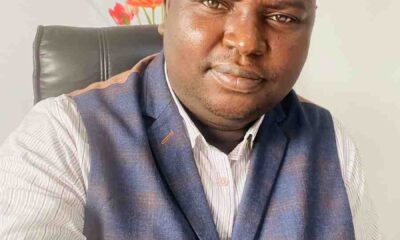Africa
Mr. President, Do It for Your Soul: Fubara, Rivers, and the Weight of June 12 -By John Egbeazien Oshodi
Mr. President, your legacy is not yet sealed. But the ink is drying fast. The world is watching to see whether you will be the man who defended June 12—or the one who silently buried its meaning. Reinstate Governor Fubara. End the emergency rule. Cut the cycle of political manipulation. And above all, restore your own alignment with the principles that once gave your voice moral weight. Let June 12 be more than a ceremony. Let it be a correction. Let it be healing—for the country, for Rivers, and for you.

This June 12 is not just another date to mark on Nigeria’s democratic calendar. It is a moment of reckoning. It is a call to those in power to remember what democracy truly means—especially for those who once risked everything for it. President Bola Tinubu is one of those men. Forged in the furnace of the June 12 struggle, he knows the cost of silence, the danger of complicity, and the weight of betrayal. Today, that same democracy he once fought for is being tested in Rivers State, where Governor Siminalayi Fubara remains suspended by a controversial emergency rule.
As a psychologist observing the deep connections between unresolved injustice, power, and personal wellbeing, this is a gentle but urgent appeal: Mr. President, restore Fubara—not just for Rivers State, but for your own soul, your legacy, and yes, your health. Because what we carry silently in our conscience does not vanish. It festers. And what festers in politics often festers in the mind and body. History has repeatedly shown that moral burdens do not disappear—they compound.
When Rejection Is a Political Weapon
When Tony Okocha, Chairman of the APC in Rivers State, declared that the party was not a “dumping ground for political sinners,” it sounded like a message of principle. But it was not about morality—it was about targeting one man: Governor Fubara. Okocha’s remarks revealed the anxiety within a faction that fears Fubara’s growing legitimacy in the eyes of the public and even the presidency. His so-called sins? Daring to govern independently. Refusing to remain under the thumb of the man who installed him.
Fubara has not even publicly announced that he is leaving the Peoples Democratic Party (PDP). And even if he did, the Nigerian Constitution guarantees every citizen the right to freedom of association and political expression. Wike does not own Fubara. Political godfatherism is not a clause in our laws. A man should not need permission to exercise his rights.
Power Without Process: The Case of a Suspended Governor
Fubara was not removed through constitutional channels. He was stripped of power through a state of emergency declared from the top—an act that bypassed Section 188, which vests removal power solely in the State House of Assembly. Instead, a sole administrator was imposed. This is not just dangerous—it is unconstitutional. The federal government may declare emergencies, but it cannot suspend the electoral mandate of a state’s executive leader without clear legal process. This political maneuver sets a precedent that endangers all state governors and undermines our federal democracy.
The Presidency, the Minister, and a Dangerous Quiet
At the heart of this crisis is an uncomfortable reality: the role of Nyesom Wike. Though still officially PDP, Wike holds a powerful post in an APC-led administration. His influence over both federal affairs and Rivers politics is so profound that some have labeled him Nigeria’s “co-president.” His shadow looms large, and his reach appears to extend beyond constitutional lines. This has created a paradox—one man, unelected to national office, wielding the kind of influence that silences even a sitting governor. And from the presidency, so far, we’ve heard little to nothing in defense of Fubara’s constitutional rights.
A Contradiction of Convenience
Ironically, Wike himself has criticized the state of emergency that removed Fubara. But this criticism was not rooted in democratic principle—it came from frustration. The emergency interrupted Wike’s larger plan: an outright impeachment via a loyal assembly. In other words, it wasn’t the suspension of Fubara that troubled him—it was the delay. This underscores a broader truth about the misuse of law in Nigerian politics: legal tools are not used to uphold justice—they are wielded like weapons by those who control them.
When Even Insiders Say Enough
Aliyu Audu, Tinubu’s former Senior Special Assistant on Public Affairs, recently resigned—and his parting message was crystal clear. He cited the erosion of democratic values and named the alliance with Wike as one of the reasons for his departure. This wasn’t an opposition critique. This was from within. Audu’s resignation was not just about Rivers—it was about the soul of the administration. When your own aides begin to say, “This is not what we promised Nigerians,” it’s time to pause. It’s time to reflect.
What June 12 Demands This Time
June 12 is not just a date. It is a question. It asks each generation of leaders: Will you honor the will of the people, or will you betray it in the shadows of politics? For Tinubu, a veteran of the June 12 struggle, the stakes are even higher. His silence on Rivers is beginning to overshadow the very ideals he once defended. The people are watching. And so is history. Because if we can suspend democracy in one state today, we can normalize that suspension nationwide tomorrow.
A Warning Dressed in Respect
This is not an attack. It is a psychological mirror. A reflection of what power does when left unchallenged. A nation that lets political convenience override constitutional order is a nation drifting toward chaos. Mr. President, you know what it means to fight from the margins of democracy. You also know what it means to be abandoned by the system. Do not now become the architect of what you once resisted. Reverse course. Restore justice. Restore Fubara.
Legacy, Leadership, and the Final Test
Mr. President, your legacy is not yet sealed. But the ink is drying fast. The world is watching to see whether you will be the man who defended June 12—or the one who silently buried its meaning. Reinstate Governor Fubara. End the emergency rule. Cut the cycle of political manipulation. And above all, restore your own alignment with the principles that once gave your voice moral weight. Let June 12 be more than a ceremony. Let it be a correction. Let it be healing—for the country, for Rivers, and for you.
Because unresolved injustice does not disappear. It waits. And when it returns, it demands more than politics can offer—it demands the truth.

John Egbeazien Oshodi
Professor John Egbeazien Oshodi is an American psychologist, educator, and author specializing in forensic, legal, and clinical psychology, cross-cultural psychology, police and prison sciences, and community justice. Born in Uromi, Edo State, Nigeria, he is the son of a 37-year veteran of the Nigeria Police Force—an experience that shaped his enduring commitment to justice, security, and psychological reform.
A pioneer in the field, he introduced state-of-the-art forensic psychology to Nigeria in 2011 through the National Universities Commission and Nasarawa State University, where he served as Associate Professor in the Department of Psychology. His contributions extend beyond academia through the Oshodi Foundation and the Center for Psychological and Forensic Services, advancing mental health, behavioral reform, and institutional transformation.
Professor Oshodi has held faculty positions at Florida Memorial University, Florida International University, Broward College, where he also served as Assistant Professor and Interim Associate Dean, Nova Southeastern University, and Lynn University. He is currently a contributing faculty member at Walden University and a virtual professor with Weldios University and ISCOM University.
In the United States, he serves as a government consultant in forensic-clinical psychology, offering expertise in mental health, behavioral analysis, and institutional evaluation. He is also the founder of Psychoafricalysis, a theoretical framework that integrates African sociocultural dynamics into modern psychology.
A proud Black Republican, Professor Oshodi advocates for individual empowerment, ethical leadership, and institutional integrity. His work focuses on promoting functional governance and sustainable development across Africa.























